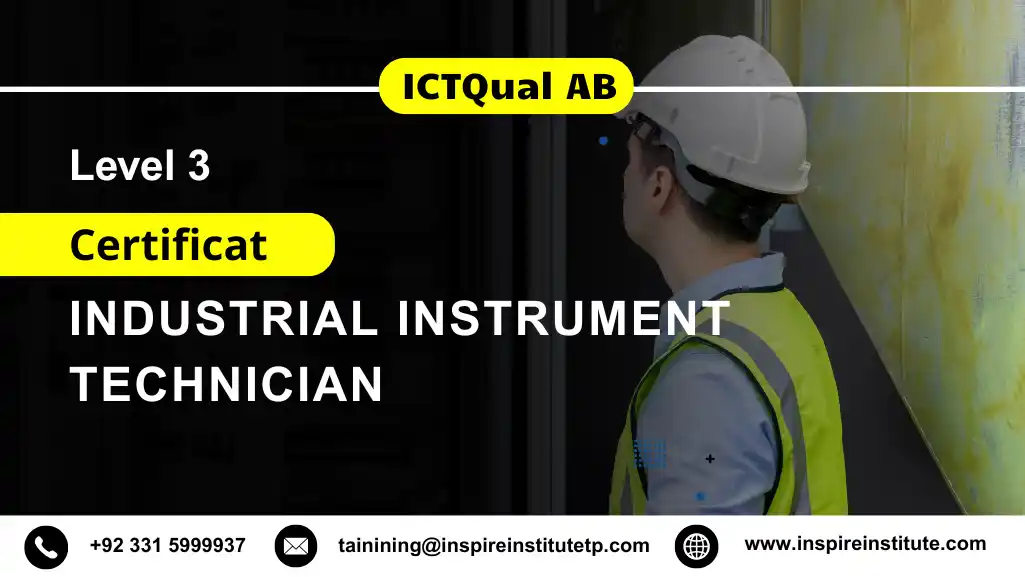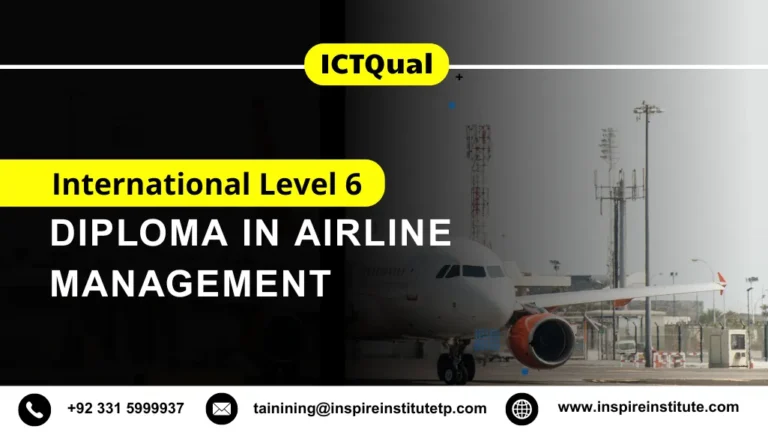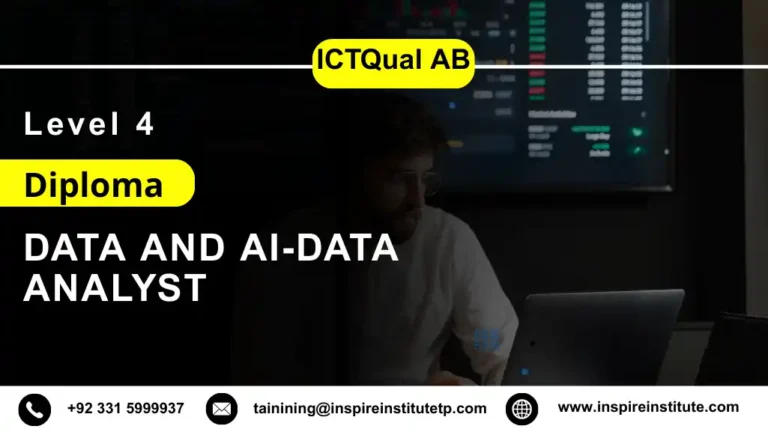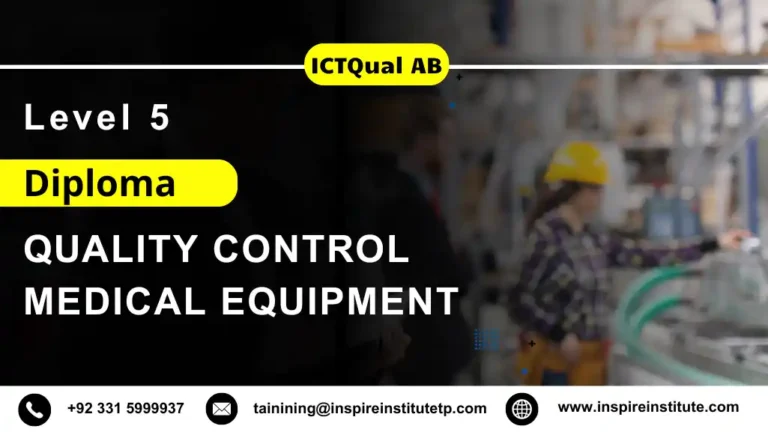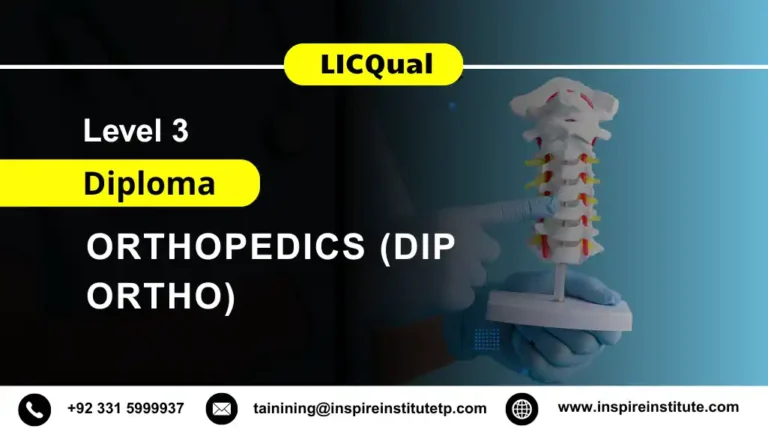ICTQual AB Level 3 Certificate in Industrial Instrument Technician
The ICTQual AB Level 3 Certificate in Industrial Instrument Technician is a highly recognized professional qualification designed to equip learners with the technical expertise required to operate, maintain, and calibrate industrial instruments and control systems. In today’s rapidly advancing industrial environment, precise instrumentation is essential for maintaining efficiency, safety, and quality across sectors such as oil and gas, manufacturing, chemical processing, and power generation. This course provides learners with the practical and theoretical foundation needed to excel as skilled Industrial Instrument Technicians in a competitive global market.
The primary purpose of this qualification is to develop a comprehensive understanding of industrial instrumentation systems, measurement principles, and control technologies. Through the ICTQual AB Level 3 Certificate in Industrial Instrument Technician, learners gain essential knowledge about sensors, transmitters, controllers, and actuators used in modern industrial setups. The course also emphasizes troubleshooting and calibration techniques, ensuring participants can confidently manage complex systems and maintain operational accuracy.
This qualification focuses on practical skill-building, preparing learners to handle real-world challenges in instrumentation and control. Students will learn to interpret process diagrams, understand system interconnections, and perform maintenance on automated systems. By mastering these competencies, graduates of the Industrial Instrument Technician course become valuable assets to any industrial organization seeking to optimize production and ensure system reliability.
The ICTQual AB Level 3 Certificate in Industrial Instrument Technician is a career-focused qualification that bridges the gap between technical theory and hands-on practice. It empowers learners to take on responsible roles in maintaining and improving industrial systems, ensuring efficiency, safety, and sustainability. Whether you are an aspiring technician or a professional seeking to advance your skills, this course offers an excellent opportunity to build a rewarding and future-oriented career in industrial instrumentation.
Why Choose this Qualification
The ICTQual AB Level 3 Certificate in Industrial Instrument Technician is an ideal qualification for individuals aspiring to build a strong foundation in industrial instrumentation and control systems. This course has been carefully designed to meet international industry standards, ensuring that learners gain the skills, knowledge, and technical expertise required to succeed in modern industrial environments. It combines theoretical understanding with practical training, preparing learners to work confidently in sectors such as oil and gas, petrochemical, power generation, and manufacturing.
Key Reasons to Choose this Qualification
1. Industry-Relevant Curriculum
- Designed in alignment with current industrial instrumentation and automation standards.
- Covers essential topics such as sensors, transmitters, process control, and calibration.
- Prepares learners to understand and manage complex industrial systems effectively.
- Provides up-to-date knowledge on modern instrumentation technologies and applications.
- Ensures learners are equipped with competencies required by employers in technical industries.
2. Strong Practical Training
- Focused on hands-on learning and real-world instrumentation practices.
- Includes practical sessions on system calibration, maintenance, and troubleshooting.
- Encourages learners to work on simulated industrial control systems.
- Develops the ability to diagnose faults and maintain process reliability.
- Helps bridge the gap between classroom theory and workplace applications.
3. Career Growth and Employability
- Opens pathways to employment in industrial sectors such as oil and gas, power, and manufacturing.
- Builds strong technical and analytical skills demanded by employers.
- Recognized internationally, enhancing job prospects across global industries.
- Prepares learners for higher-level studies or specialization in instrumentation and control engineering.
- Enables professionals to progress to supervisory or senior technical positions.
4. Comprehensive Technical Knowledge
- Provides in-depth understanding of process control, instrumentation, and system integration.
- Develops the ability to interpret technical diagrams and process flowcharts.
- Teaches principles of measurement, signal transmission, and process control loops.
- Encourages proficiency in using industrial control software and calibration tools.
- Strengthens the learner’s capacity to design, install, and maintain instrumentation systems.
5. Focus on Safety and Compliance
- Emphasizes adherence to industrial safety protocols and standards.
- Trains learners to identify and mitigate operational hazards effectively.
- Promotes awareness of environmental and regulatory requirements.
- Incorporates best practices in equipment handling and maintenance safety.
- Develops a culture of responsibility and compliance within industrial environments.
6. International Recognition and Accreditation
- The ICTQual AB Level 3 Certificate in Industrial Instrument Technician is globally recognized.
- Ensures qualification credibility for international career opportunities.
- Meets recognized industry benchmarks for technical education and competence.
- Offers professional credibility in both local and global industrial sectors.
- Enables smoother transition into further technical or engineering qualifications.
7. Skill Enhancement and Professional Development
- Enhances both technical and soft skills essential for industrial professionals.
- Strengthens communication, teamwork, and problem-solving abilities.
- Encourages independent thinking and continuous learning in the field of instrumentation.
- Builds confidence in managing and maintaining advanced control systems.
- Supports long-term professional growth and lifelong learning.
8. Flexible Learning Approach
- Designed for both aspiring technicians and working professionals.
- Offers an adaptable learning experience suitable for various learning needs.
- Combines theory, assignments, and practical tasks for well-rounded competence.
- Encourages self-paced study while maintaining academic quality.
- Allows learners to balance professional commitments with technical skill development.
The ICTQual AB Level 3 Certificate in Industrial Instrument Technician stands out as a comprehensive and career-focused qualification that bridges theory and practice. It empowers learners to meet global industry demands with confidence, precision, and professionalism. By completing this course, individuals gain not only a recognized certification but also the practical expertise to advance their careers in the ever-evolving field of industrial instrumentation and control systems.dset required to drive business growth, innovation, and sustainable enterprise in an ever-evolving global market..
Course Overview
UK based Qualification
Study Units: 6 Units
Evidence & Assignment Based
Course Level: Level 3
Qualification Structure
This qualification, the Level 3 Certificate in Industrial Instrument Technician, consists of 6 mandatory units.
- Fundamentals of Industrial Instrumentation
- Process Variables: Pressure, Temperature, Flow, and Level
- Instrument Calibration and Testing Techniques
- Industrial Sensors, Transducers, and Control Valves
- Programmable Logic Controllers (PLCs) and Process Automation
- Maintenance, Troubleshooting, and Industrial Safety
Who Should Take This Course
The ICTQual AB Level 3 Certificate in Industrial Instrument Technician is a comprehensive qualification designed for individuals aiming to build a successful career in industrial instrumentation and control. This course provides the essential technical knowledge and hands-on experience required to work effectively in a range of industrial settings. Whether you are a beginner entering the field or an experienced professional seeking to enhance your technical competencies, this qualification offers the right balance of theory and practice. It caters to learners who aspire to develop expertise in system calibration, process control, maintenance, and instrumentation troubleshooting — all critical components of modern industrial operations.
This course is suitable for
1. Aspiring Industrial Instrument Technicians
- Ideal for individuals seeking to start a career in the field of industrial instrumentation.
- Provides foundational knowledge in measurement, control systems, and instrumentation devices.
- Equips learners with the ability to operate, maintain, and calibrate industrial instruments.
- Helps new entrants develop confidence in handling technical systems and processes.
- Serves as a recognized qualification for gaining entry-level technical positions.
2. Maintenance and Calibration Technicians
- Perfect for technicians aiming to upgrade their practical and theoretical skills.
- Enhances expertise in equipment calibration, inspection, and preventive maintenance.
- Develops the ability to identify and troubleshoot instrumentation faults efficiently.
- Strengthens understanding of quality control and process accuracy.
- Improves technical documentation and reporting capabilities.
3. Process Control and Automation Professionals
- Suitable for professionals working in process industries such as oil and gas, power, and manufacturing.
- Provides advanced insights into control loops, sensors, actuators, and transmitters.
- Improves understanding of process automation and system optimization.
- Equips learners with techniques to ensure safety, reliability, and efficiency in operations.
- Enhances skills to work collaboratively in multidisciplinary engineering teams.
4. Engineering and Technical Students
- Beneficial for students pursuing studies in engineering, electronics, or instrumentation fields.
- Complements academic learning with practical industrial applications.
- Builds familiarity with industrial processes, control systems, and measurement principles.
- Offers an opportunity to gain a recognized qualification alongside formal education.
- Prepares learners for future employment or advanced technical studies.
5. Supervisors and Industrial Team Leaders
- Designed for supervisors seeking to understand the technical aspects of instrumentation systems.
- Improves decision-making through deeper technical knowledge and process awareness.
- Enhances leadership in managing maintenance and calibration teams.
- Strengthens ability to implement operational safety and quality standards.
- Supports performance monitoring and process improvement initiatives.
6. Professionals Seeking International Recognition
- Ideal for individuals aiming to gain a globally recognized technical qualification.
- Helps professionals enhance their credentials for international employment opportunities.
- Meets global standards in industrial instrumentation and control education.
- Builds competence to work confidently across different industrial environments.
- Enables career mobility within global markets and multinational industries.
7. Industrial Safety and Quality Control Personnel
- Suitable for those involved in ensuring safety, compliance, and system integrity.
- Provides understanding of safe working practices in instrumentation environments.
- Strengthens ability to identify potential system risks and hazards.
- Enhances monitoring of system performance and quality control parameters.
- Promotes the development of standard operating procedures and maintenance records.
8. Career Changers and Technical Enthusiasts
- Ideal for individuals looking to transition into the field of industrial instrumentation.
- Offers practical, structured learning for professionals from other technical disciplines.
- Builds a new career pathway in automation, maintenance, and process control.
- Encourages skill diversification for enhanced employability and job satisfaction.
- Provides a stepping stone toward advanced qualifications in instrumentation engineering.
The ICTQual AB Level 3 Certificate in Industrial Instrument Technician is suited for a diverse range of learners — from aspiring technicians to experienced professionals seeking advancement. It provides the technical depth, practical expertise, and international recognition necessary to thrive in the modern industrial landscape. By enrolling in this qualification, learners can open doors to rewarding career opportunities in instrumentation, automation, and control across multiple global industries.fessional credibility, strategic insight, and practical expertise needed to thrive in business leadership, while making a meaningful contribution to innovation, economic growth, and society at both national and global levels.
Course Benefits
The ICTQual AB Level 3 Certificate in Industrial Instrument Technician offers a wide range of professional, academic, and practical benefits for learners aiming to establish or advance their careers in the field of industrial instrumentation and control systems. This qualification combines theoretical learning with practical applications, ensuring that graduates are fully equipped to meet industry demands. Learners gain in-depth knowledge of instrumentation principles, process control, maintenance, and system calibration — all of which are vital for maintaining efficiency and safety across industrial sectors such as oil and gas, manufacturing, and power generation.
Key Benefits of the Course
- Specialist Knowledge:
Gain a comprehensive understanding of industrial instrumentation and control systems, including the principles of measurement, calibration, and automation technologies. Learners explore critical areas such as sensors, transmitters, actuators, and process control systems. The course also covers advanced diagnostics, troubleshooting strategies, and system integration techniques, providing professionals with the knowledge to manage complex industrial operations confidently. - Practical Application:
Develop hands-on skills through real-world simulations, practical exercises, and assignment-based tasks. Learners enhance their ability to calibrate, install, maintain, and troubleshoot instrumentation devices effectively. The program trains professionals to implement process control strategies, optimize system performance, and collaborate with multidisciplinary teams for smooth industrial operations and reliable outcomes. - Recognised Qualification:
Earn the globally respected ICTQual AB Level 3 Certificate in Industrial Instrument Technician, validating your technical expertise and professional competence. This UK-accredited qualification ensures learners meet industry standards, enhancing credibility and opening career opportunities in sectors such as oil and gas, manufacturing, power generation, and automation industries worldwide. - Flexible Learning Pathway:
Designed for both aspiring and working technicians, the assignment-based structure allows learners to study without disrupting professional commitments. Participants can progress at their own pace while accessing structured guidance, digital resources, and personalized support. This approach provides an effective balance between career responsibilities and skill development in industrial instrumentation. - Evidence-Based Training:
Engage with the latest industry practices, technical guidelines, and automation technologies. The course emphasizes applying evidence-based maintenance, calibration, and process control techniques. Learners develop the ability to critically assess system performance, implement standardized procedures, and ensure operational efficiency and safety in real industrial environments. - Career Development:
This qualification expands career prospects across industrial sectors including oil and gas, petrochemicals, power plants, and manufacturing. Graduates may pursue roles such as Instrumentation Technician, Control Systems Technician, Process Engineer, or Maintenance Supervisor. It also provides a strong foundation for further technical studies or advanced certifications in industrial instrumentation and automation. - Enhanced Operational Impact:
Learn to optimize and maintain industrial processes ethically, safely, and efficiently. The course builds competence in system calibration, fault diagnosis, and process optimization, empowering graduates to improve reliability, reduce downtime, and enhance productivity. This results in measurable improvements in industrial operations and operational safety standards. - Professional Growth:
Strengthen critical thinking, problem-solving, technical reasoning, and communication skills essential for instrumentation professionals. The ICTQual AB Level 3 Certificate encourages reflective learning, teamwork, and strategic decision-making. Graduates emerge as confident, skilled professionals capable of advancing standards in industrial instrumentation and contributing to modern automation initiatives globally.
The ICTQual AB Level 3 Certificate in Industrial Instrument Technician provides measurable, lasting benefits by equipping learners with technical knowledge, practical skills, and professional credibility. This qualification empowers individuals to excel in industrial environments, enhances career prospects, and serves as a stepping stone for further education and professional growth, ensuring readiness for the challenges of today’s technology-driven industrial sectors.
Eligibility Criteria
The ICTQual AB Level 3 Certificate in Industrial Instrument Technician is designed to provide learners with the technical knowledge, practical skills, and professional expertise required to thrive in industrial instrumentation and control environments. This globally recognised qualification is suitable for beginners and working professionals alike, offering a flexible pathway that supports career development, technical proficiency, and hands-on application in modern industrial sectors.
Minimum Age:
The ICTQual AB Level 3 Certificate in Industrial Instrument Technician, learners must be at least 18 years old. This ensures they have the maturity and readiness to grasp Level 3 technical concepts and effectively engage in practical exercises, simulations, and assessments, developing the skills needed for a career in industrial instrumentation.
Educational Background:
Completion of secondary education or equivalent is required.
Backgrounds in science, engineering, or technical disciplines are advantageous but not mandatory.
Ensures learners can understand fundamental principles of measurement, process control, and instrumentation.
Provides a foundation for learning both theoretical concepts and practical applications.
Supports progression into hands-on technical training in industrial systems.
Professional Experience:
Individuals without prior industrial experience can enrol directly into the programme.
Practical skills are developed through hands-on exercises, simulations, and assignment-based tasks.
Learners already in technical, maintenance, or process control roles can focus on advanced instrumentation techniques.
Encourages the application of both theoretical knowledge and workplace experience.
Supports career growth by improving troubleshooting, calibration, and system management skills.
Language Proficiency:
The course is delivered in English, so learners must demonstrate strong written and spoken English skills.
Ensures effective comprehension of technical content and accurate completion of assessments.
Supports proper documentation of calibration, installation, and maintenance tasks.
Facilitates clear communication in both academic exercises and practical industrial applications.
Prepares learners for professional environments where English is the standard for technical reporting.
Future Progression
The ICTQual AB Level 3 Certificate in Industrial Instrument Technician is a career-focused qualification that equips learners with the knowledge, technical expertise, and practical skills necessary for a successful future in industrial instrumentation and control. Upon completion, graduates are well-prepared to take on technical roles, enhance their career prospects, and pursue higher-level education or specialised certifications. The programme provides a structured pathway for long-term professional growth in a variety of industrial sectors.
Career Opportunities After Completion
Entry-Level Technician Roles
- Eligible for positions such as Industrial Instrumentation Technician, Process Control Technician, or Maintenance Technician.
- Gain practical experience in installation, calibration, and troubleshooting of industrial instruments.
- Contribute to process optimisation, system reliability, and operational efficiency in manufacturing or industrial plants.
- Build a foundation for supervisory roles as skills and experience grow.
- Opportunities across sectors including oil and gas, power generation, and automation industries.
Advanced Technical Positions
- Progress to roles like Control Systems Technician, Instrumentation Engineer Assistant, or Automation Support Specialist.
- Apply advanced process control, fault diagnosis, and system integration techniques.
- Lead small teams in maintenance, calibration, and operational projects.
- Engage with modern automation software and instrumentation technologies.
- Increase responsibility in managing complex industrial systems and processes.
Pathways to Further Qualifications
Higher-Level Industrial Certifications
- Pursue Level 4 or Level 5 qualifications in Industrial Instrumentation, Electrical Engineering, or Process Control.
- Gain specialised knowledge in automation, control systems, and industrial safety.
- Build competencies required for engineering technician or supervisory roles.
- Enhance career prospects and professional credibility in international industrial markets.
- Combine with professional certifications for global recognition and employability.
Academic Progression
- Entry to Higher National Certificates (HNC), Higher National Diplomas (HND), or degree programmes in Instrumentation, Electronics, or Control Engineering.
- Develop academic understanding alongside practical industrial experience.
- Opportunities to specialise in automation, process optimisation, or industrial management.
- Access pathways to engineering or technical management roles in the future.
- Supports long-term career growth with both technical and academic credentials.
Professional Development and Skills Enhancement
- Strengthen problem-solving, analytical thinking, and technical reasoning skills.
- Build leadership, teamwork, and communication abilities for industrial workplaces.
- Develop expertise in safety standards, compliance, and operational efficiency.
- Improve confidence to handle complex instrumentation systems independently.
- Prepare for continuous learning, advanced certifications, and career progression.
The ICTQual AB Level 3 Certificate in Industrial Instrument Technician provides a solid foundation for future career progression, advanced technical roles, and higher education opportunities. It ensures learners are fully equipped with the practical skills, theoretical knowledge, and professional competence required to succeed in diverse industrial sectors and pursue long-term professional growth in industrial instrumentation and control.

